Three PA Students Traveled 7,800 Miles for Their Pediatric Clinical Rotation in Africa
Giving back on a global scale, from Atlanta to Kisumu, Kenya
September 30, 2023
By Alex Morse
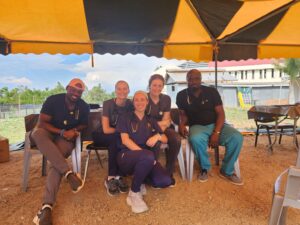
To broaden their perspectives on healthcare, three PA students traveled over 7,800 miles to serve their pediatric clinical rotation. Katie Holliday, Elijah Netjes, and Sydney Smith, students at Mercer’s College of Health Professions, jumped at the opportunity to serve patients at Point of Grace Academy, a boarding school that houses approximately 800 students near Kisumu, Kenya.
Students enrolled in Mercer University’s PA Program have at least two opportunities to serve their clinical rotations abroad, and many students choose that program for that very reason. Mercer alumna and pharmacist Scarlet Holcombe, class of 1991, leads groups of PA students every year to aid in international outreach – which starts long before they board a plane.
Before they left Atlanta, Holliday, Netjes, and Smith helped organize a donation drive to collect clothing and other necessities, to help replenish after a fire destroyed the top floor of one of the boys’ dormitories in Kenya. Once they gathered all the donations and medical supplies they needed, they took part in a “packing party” and filled about 40 suitcases.
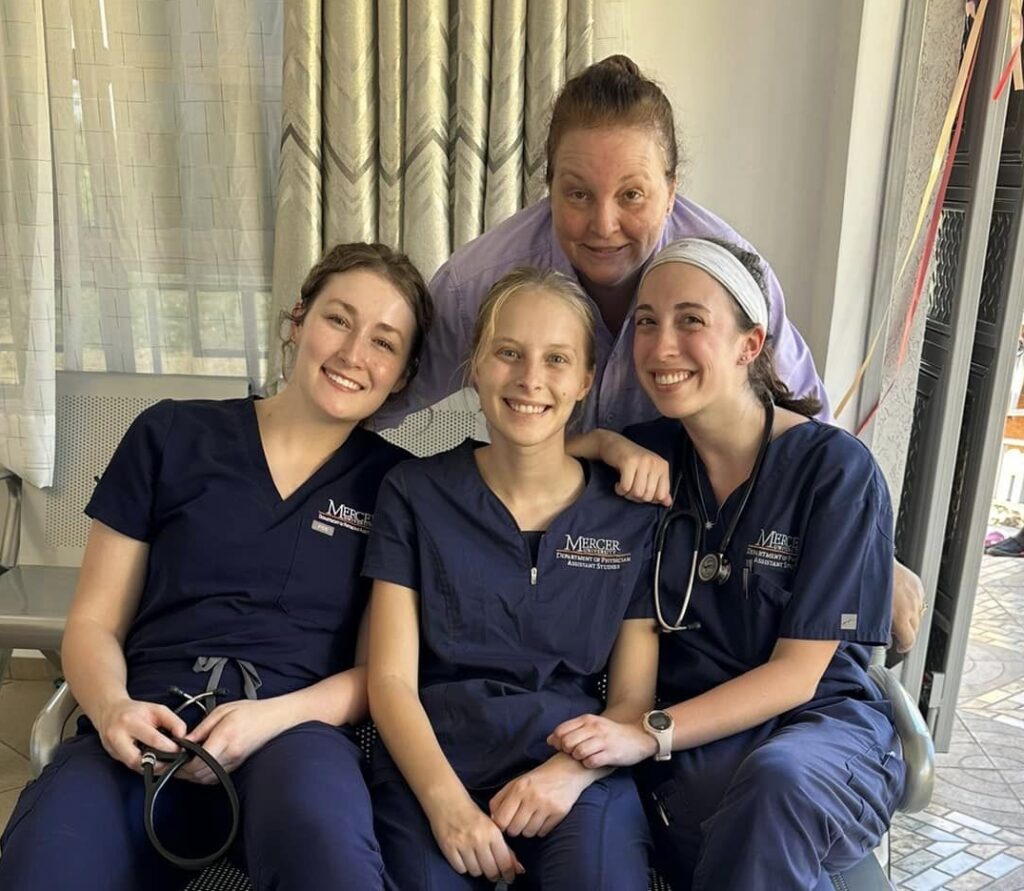
Serving the Community One Patient at a Time
On their first day in Kenya, they hit the ground running by unpacking and organizing their supplies, before taking a tour of the clinic and prepping for patients. The clinic consisted of one room with a small pharmacy attached, and tents set up outside for triage and a patient waiting area.
A tier system was used to determine whether a patient would be seen at the clinic or at a hospital. Simple ailments, such as a cut or prescription fill, were handled in the clinic. Anything that required more, like childbirth, was escalated to the local county hospital, and any patients who needed additional procedures, such as imaging, were sent to a larger hospital in town.
Holcombe and her husband, emergency department physician Joel Holcombe, served as their main preceptors and leaders at the clinic during their first week. During that time, while they had the company of other volunteers, Holliday, Netjes, and Smith treated community members of all ages, from infants to geriatric patients, and then the school children, ranging from pre-K to high school. During that first week they served over 800 patients, treated 85 positive malaria cases, and wrote 2,160 prescriptions.

The group was limited to the supplies they had on hand, and the PA students often stayed hours after closing to help the pharmacy fill the remaining 50-100 prescriptions. “Usually, for everyone, we gave out multivitamins, and those things were already packaged, but things like antibiotics and any creams or lotions were done separately,” Netjes said. “It all needed to be individually bagged and then the instructions written in a way that anyone could understand. So, we would write on the backs something like 3 X 1, so they would know to take three pills once a day.”
The experience showed Netjes the importance of education during a patient visit, ensuring that even through a language barrier, patients could follow through with their treatment and understood their treatment plan.
Gaining Insight into the Patient Experience
After the first week, the larger group of volunteers left, and Holliday, Netjes, and Smith worked the last two weeks primarily at the sub county hospital with Kenyan clinical officers. They transitioned from working in the clinic – which was just a short walk from their lodging – to the hospital, a 30–40-minute drive away in Kisumu, to spend the mornings doing outpatient work. During their three-week stay, they saw a lot of malaria, several wounds, and possible cases of tuberculosis.
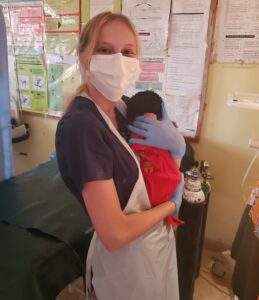
As their time in Kenya came to a close, the students spent some quality time with the school children, each of them teaching a class on anatomy and playing sports.
One of their most exciting memories from the trip was helping to deliver a baby. “Katie catching the baby was incredible to watch,” Netjes said. “Just seeing how many good things my peers are doing and how much of an impact one person can make is really inspiring to me and makes me want to work harder every day.”
Netjes emphasized the that it’s important for PA students to broaden their understanding of the patient experience, even if they don’t travel abroad. “It’s really unparallel to anything else to live and experience another culture and another way of living so that you can understand where a patient might be coming from,” she said. “I think one of the biggest things that anyone should learn during their clinical year is really understanding the patient and their background. It’ll help you treat them better, and understand how to talk to them and give them what they need.”
Smith, who was originally going to write her thesis on recognizing and diagnosing PTSD in the pediatric population, changed her topic after this trip to include the students of Point of Grace Academy. She is also considering creating a questionnaire for future PA students who travel to Kenya, so they can provide the best resources for each child.
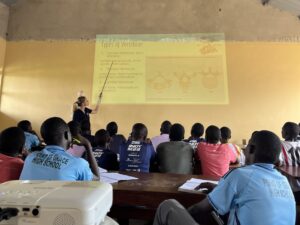
Community: An Immeasurable Impact
Whether it is driving hours to take a child to a hospital or providing students with materials they need, the entire Kisumu community steps up to help take care of each other. “Someone had a family member pass away while we were there, and just seeing how the community rallied around them was amazing. It’s a community loss, not just a family loss,” Holliday said.
The PA students were in awe of the sense of community that they witnessed, and Smith stressed its importance when it comes to global health. “It was amazing to see people step up and do the best they could for the kids and their community members to get them what they needed, or the closest alternative.”
Despite originally considering a hospital-based career, this experience drew Holliday toward family practice. “It really honed in on the importance that family practice plays, how that’s your initial screening for anything that comes through, and how important it is for you to be extremely careful and observant of your patients.”
The clinic will remain open and run by clinical officers on a weekly basis. Holliday, Netjes, and Smith are excited about the prospect of returning after they graduate, hopefully as preceptors.
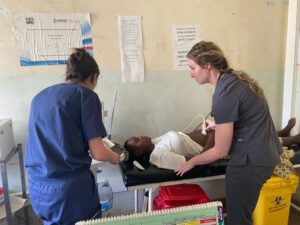
“They need a few more preceptors just to make things more efficient, because [the PA students] have to run everything by a licensed provider and we only had one that was doing everything with us,” Holliday said.
This was not only an experience that will live in their memories forever, but has also inspired them in ways they never imagined. They emphasized that none of this would be possible without the help of the Kenyan clinical officers at the clinic and outpatient clinic. They made connections and friends they still keep in contact with and experienced a different perspective on medicine. “Going abroad is immersing yourself explicitly in another way of living,” Netjes said, “and it’s not only going to help you understand [your patients] but also broaden your own experience as well.”
Alex Morse is AAPA’s Communications Associate. She can be reached at [email protected].
You May Also Like
PA Students Learn to Care for LGBTQ Patients
PA Jenna Everett Co-Built a Program to Provide Support to Underserved Patients Who Frequently Visit the Emergency Department
Bernard Toney Jr.: How a Troubled Youth Transformed his Life as a PA
Thank you for reading AAPA’s News Central
You have 2 articles left this month. Create a free account to read more stories, or become a member for more access to exclusive benefits! Already have an account? Log in.



